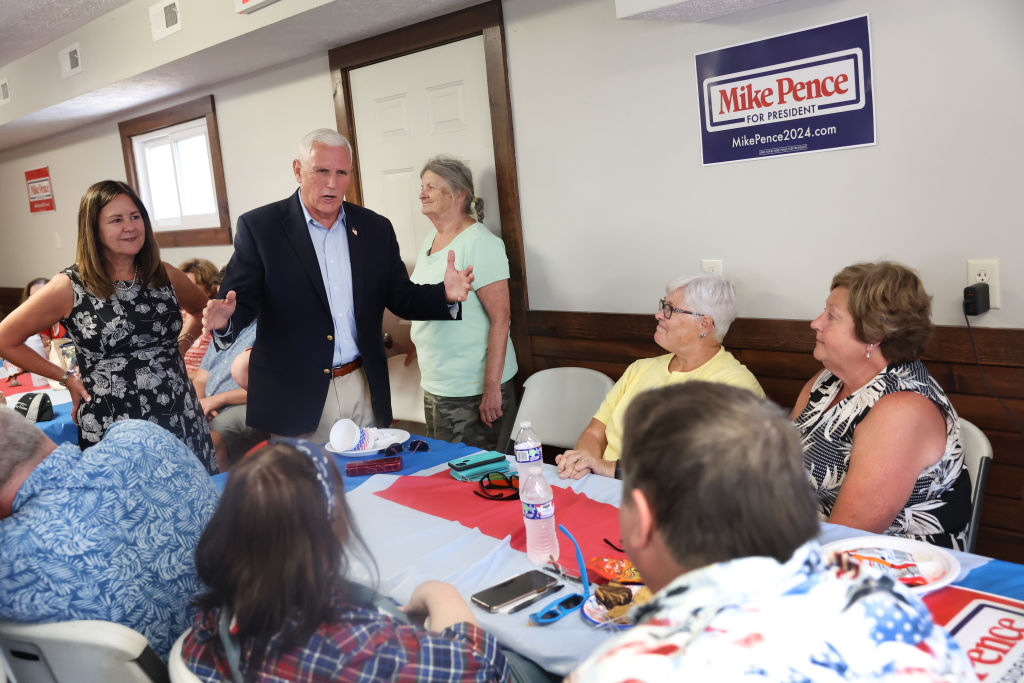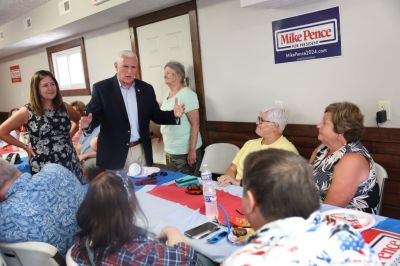SIOUX CITY, Iowa—Don’t look now, but at the moment former Vice President Mike Pence is becoming the most interesting candidate for president.
It’s understandable if that’s hard to fathom. Donald Trump has far more star power than his former running mate, along with leads in every national and early state primary poll. Those same polls show Gov. Ron DeSantis in a far better position to challenge Trump. And rivals like former Gov. Chris Christie and businessman Vivek Ramaswamy are doing a better job grabbing media attention than Pence, who has never been known for his charisma.
Yet Pence is doing something unusual, even radical, within the 2024 GOP field: He’s running as a movement conservative, a traditional Republican, and an experienced politician in a party whose recent history suggests little appetite for any of that. But the Pence campaign has challenged the conventional wisdom: What if the party isn’t really all that enthralled by Trump and Trumpism?
“I’m running because the things that I’ve always been about, the things that our administration was about, I’m going to continue to be about,” Pence tells The Dispatch in Sioux City. “American leadership in the world, fiscal responsibility and reform, the right to life. And frankly, the [former] president is walking away from those things overtly, and others are walking away from it. And I’m going to continue to stand on the conservative ideas and values that I’ve always stood on, and give Republican voters a choice.”
After three disappointing national election cycles for the GOP, the nationalist and populist forces elevated by Trump persist. Most of his primary rivals are trying to sell themselves as more saleable versions of Trump, while some like Christie focus almost entirely on making the moral and practical cases against renominating him.
Pence, on the other hand, thinks Republicans mostly retain their pre-Trump views on issues from government spending to foreign policy to abortion. Yet he also recognizes that the movement and the party have absorbed some of Trump’s more populist views on immigration and trade. It’s a dynamic the Hoosier Republican is perhaps most comfortable with, even as his path to the nomination remains unclear.
The Pence pitch.
As he crisscrosses Iowa, the state where he launched his presidential campaign in June, Pence makes a remarkably straightforward sell to Republican caucusgoers: vote for a consistent Reagan-style conservative with a career to prove it. His message is one of reassurance, not revolution.
“I know how the Congress works. I’ve run a state and know what it takes to get a state growing, I know the things that states are supposed to do, not the federal government. And I’ve been in an administration that demonstrated when we put conservative principles into practice, great things happen,” Pence says to voters in Boone, near Ames. “I think this is no ordinary time, no time for on-the-job training.”
He talks up his pushback, as a member of the U.S. House, against increased spending during the George W. Bush administration. He mentions holding the line as governor of Indiana with his Republican-controlled legislature to get tax cuts and defending his state’s religious freedom law when it came under fire from the national media. He even touts the most conservative policies on immigration enforcement and global trade of the “Trump-Pence administration.”
In a few key areas, Pence makes his rejection of Trump-style populism explicit. He speaks at length on the fiscal necessity of reforming old-age entitlement programs, while telling The Dispatch that “the former president’s position on this issue is identical to Joe Biden’s.” Although some national Republicans argue against American support for Ukraine, Pence calls for more—the same message he had while visiting Ukraine last month.
“I think they’re following a sentiment among a minority of Republicans. But they’re not leading,” Pence tells The Dispatch. “This is a moment, I think, where you’ve got to be willing to square your shoulders and tell people the truth. I’ve never had any illusions about Putin. In the 2016 vice presidential debate, I called him a small, bullying leader of Russia.”
On perhaps the most defining moment of Pence’s vice presidency—his refusal to comply with Trump’s demand to stop the counting of electoral votes on January 6, 2021—he remains resolute that he was right and Trump was wrong.
A woman at an event in Sioux City asks him to explain his refusal to “send the votes back to the states.” This issue “continues to be misunderstood,” Pence calmly responds. “I know, by God’s grace, I did exactly what the Constitution of the United States required of me that day, and I kept my honor.” And over the course of 3 days in Iowa, several Republican voters expressed their admiration for Pence’s actions on January 6, unprompted by The Dispatch.
Pence’s position on January 6, and a host of other issues, are notable, especially given the direction the GOP has taken in recent years. Trump’s victory in 2016 convinced many observers that the new president’s ideological deviations and uncouth style showed the future of Republican politics. In this telling, Pence’s addition to the ticket was nothing more than a nod to the dying conservative establishment.
But Pence is counting on Republican voters—or, for starters, Republican voters in Iowa—having a renewed taste for the conventional.
Pence’s pathway.
In national polls, Pence is currently running at a distant third behind Trump and DeSantis, with a RealClearPolitics polling average of just 6 percent. It’s even worse in the early states, where scant polling in Iowa and New Hampshire indicate Pence is also behind the top two candidates and somewhere in the mix of other “also-runnings” in the low single digits.
But it’s early, and there’s reason to believe Pence has been underestimated so far. His renown as the former vice president, for example, is an underappreciated asset. His appearance last week at the Independence Day parade in a suburb of Des Moines left many people looking starstruck—or something close to it.
There was the murmur as onlookers began to recognize the unmistakable white hair. People waved and shouted, phones in the air to capture the sighting of a true VIP. One father whose young son has just taken his picture with Pence tells The Dispatch that he’s a Democrat and won’t be at a Republican caucus next year—“but, I mean, it’s Mike Pence!”
The former vice president regularly talks on the campaign trail about how he and his wife Karen are “well known, but not known well.” It’s a convenient way for Pence to retell the story of his personal life and his decades in public service. But it’s not quite right to say he isn’t known well: For four years Americans got to know the mild-mannered Hoosier largely by how he contrasted with the bombastic New York mogul he served alongside in the White House.
That contrast has persisted on the campaign trail. While Trump insults his enemies and dismisses his critics, Pence talks about wanting to “restore a threshold of civility” in political discourse.
“He’s a common, ordinary man,” says Wilmer Hulstein, a comment which gets approving nods from the table of senior citizens outside a coffee shop in Sioux Center. When Pence stops by, Hulstein’s friend Carol Apol tells the candidate that she’s praying for him. None of the group say they will support Trump again in the caucuses.
To have any hope of winning the nomination, Pence will need to win—or, at the very least, do better than Trump—at the Iowa caucuses in January. To do that, he’ll have to win over all of these voters who admire him and then some. Those close to Pence say that coalition looks a little like those of Mike Huckabee in 2008 and Rick Santorum in 2012, both of whom won the caucuses with the support of evangelical Christians and social conservative voters. But Pence will also need the more Main Street-type Republicans, based in the suburbs of Des Moines, looking to move the party beyond Trump. Competition for those caucusgoers will be fierce.
While Pence may have just as good a claim on the non-Trump Republican vote, the question still remains: How many of these voters still exist in the party? For those opposed to Trump, there’s a discouraging symbol along U.S. 169 not far outside of Boone, where Pence had such a warm reception among small business owners. The very large sign clearly once read, “Trump-Pence 2020.” But Pence’s name has been deliberately and completely cut out, exposing the brown wooden fence underneath.







Please note that we at The Dispatch hold ourselves, our work, and our commenters to a higher standard than other places on the internet. We welcome comments that foster genuine debate or discussion—including comments critical of us or our work—but responses that include ad hominem attacks on fellow Dispatch members or are intended to stoke fear and anger may be moderated.
With your membership, you only have the ability to comment on The Morning Dispatch articles. Consider upgrading to join the conversation everywhere.